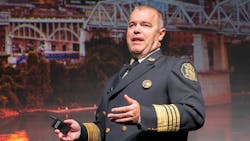FHExpo18: Keynote Speaker Honors Past While Looking to Future
Source Firehouse.com News
Adam K. Thiel, fire commissioner of the city of Philadelphia, knows a thing or two about tradition. He is the 20th commissioner in the city where Ben Franklin started the nation’s first fire department and was the first fire chief. He also recognizes the importance of keeping current and most importantly, the need to shape the future.
In his keynote address, titled “Appreciate the Past, Be in the Present, Create the Future,” Thiel said firefighters have the reputation of getting things done.
“We are the ultimate ‘can do’ people,” Thiel said. “We get it done and pay the ultimate price if necessary. No matter what happens, we get it done.”
That legacy doesn’t happen by accident, Thiel said to the attendees at Firehouse Expo gathered at the Music City Center in Nashville, TN, for the opening ceremony. It takes hard work and dedication, he said.
Thiel has 26 years in the fire service, serving in five states all over the country, he said he’s never seen a fire department with too many resources.
“Not one,” he said. “Not one in all the departments I’ve visited. Yet, it always gets done.”
Even in his own department, which started in 1736, Philadelphia gets it done.
Thiel said it takes training, experience and self-examination to be an effective firefighter.
“We appreciate our past by replicating the great traditions of the firehouse,” Thiel said. “The firehouse meals. If you have a birthday or a promotion, you get a pie in the face. Gently, of course. The brotherhood and sisterhood is worthy of what we do and worthy of what we call ourselves, and on our best days, what we are, a family. We must continue to appreciate those traditions.”
One way to learn is hearing stories from retired firefighters in a series of alumni events, consisting of luncheons or breakfasts.
He said while we remember and embrace the good things and the good traditions of the past, there are some thing the fire service doesn’t want back … the history of fire deaths and injuries.
“Thankfully, it is not what it once was, but there are still too many,” he said, “and that has to change.”
Thiel said there was a time when he couldn’t wait for the next fire, it’s what firefighters do, but his thoughts have changed.
“I’ll be OK if I never fight a fire again,” he said. “I’ll be OK if I never watch another child zipped into a body bag. I’ll be OK if I never have to sign for another one of my firefighters as we transfer them from the hospital to the morgue.”
But fires are still a problem in the United States, he said, adding, “America is still burning today.”
He said the fire loss annually still amounts to 2 to 3 percent of GDP.
Thiel said we have to be in the now, the present.
“We’re not waiting for the 21st century, it’s now, it’s not new it’s here and there’s a lot of work to be done,” Thiel said.
Firefighters take care of people who need help and that’s a “sacred trust” that carries on across the country, he said. Firefighters are the most trusted professionals around the world, he added.
“There are people who call us heroes and that’s truly a lot to live up to,” Thiel said. “We are of and for our communities and sometimes we forget that. We cannot be just about ourselves.”
Moving forward, Thiel said firefighters have to create the future, or it will be created for us.
“And it will be made out of plywood and who knows what,” Thiel said. “A wise man once told me either you are at the table or you are on the menu.”
Thiel said it’s sometimes difficult to talk about fire departments in “cold, hard business terms,” but it’s important to the future of the fire service.
“Everybody will pat us on the head, and love us and trust us, but they may or may not fund us,” Thiel said. “It may sound crass to talk about the fire service in dollars and cents. And the good news is we don’t have to talk about it that way. Because what we do has true meaning on the fabric of our communities and our neighborhoods.”
He concluded by saying the right thing to do for the community lines up with the right thing to do economically and financially.
“There’s a cold, hard business case for fire protection and an increased investment in fire protection in this nation now,” Thiel said. “We have to collectively make that case. We’re all in this together.”
Thiel said there is always an opportunity for the fire service to do what it does better by embracing the future.
“We need to make the changes on the firm foundation of those who have gone before us,” Thiel said. “By appreciating our past, being in the present and working together from coast to coast to create a future where both we, and those we serve, are safe from the ravages of fire.”






